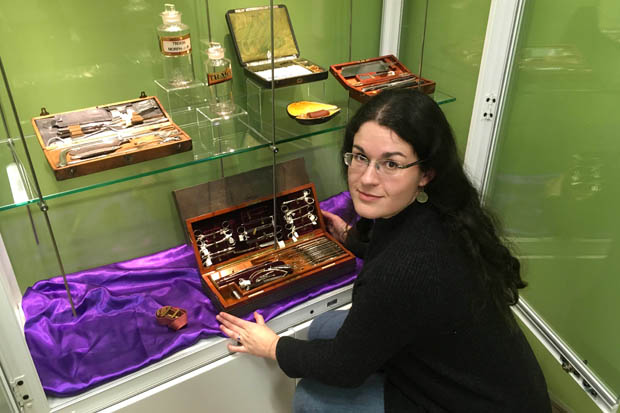An interactive exhibition exploring the wonder and fear of 19th Century medical science in a family-friendly way is being displayed at The Atkinson in Southport from Saturday (9th February).
Dr Jekyll’s Study: Science and Medicine in the 19th Century is set in a Victorian doctor’s study, complete with real surgical instruments and medical equipment from the period, and exhibits to test if visitors have the steady hand and nerve needed by a surgeon of that era.
The 19th Century was a time of rapid advances in science and medicine. Researchers made new discoveries about the human body and mind that were thrilling, but could also seem terrifying.
Some of the most famous monsters in fiction were inspired by the scientific discoveries of their times and this exhibition allows visitors to explore the connections between 19th Century medicine and the literary works that it influenced, such as Frankenstein (1818), Dracula (1897) and The Strange Case of Dr Jekyll and Mr Hyde (1886).
‘…women like Mary Seacole and Florence Nightingale, who pioneered new nursing techniques and paved the way for the first female doctors,…’
Visitors can learn about the women like Mary Seacole and Florence Nightingale, who pioneered new nursing techniques and paved the way for the first female doctors,and paved the way for the first female doctors, and see first editions of the Sherlock Holmes stories whose author, Arthur Conan Doyle, also trained as a doctor before turning his hand to writing fiction.
The exhibition has been developed and curated by Edge Hill academics Dr Laura Eastlake, Dr Andrew McInnes and Dr Bob Nicholson, all from the Department of English, History and Creative Writing and Dr Douglas Small, a Wellcome Trust Research Fellow from the University of Glasgow. The contributors are all specialists in 19th Century literature, history and medicine, and the exhibition which is sponsored by Alcohol Research UK and the Past and Present Society, follows Edge Hill’s 2018 conference Substance Use and Abuse in the Long Nineteenth Century. The medical equipment, which includes anaesthetic and ophthalmological instruments, is loaned by the Thackray Medical Museum, Leeds.
Andrew said: “Our key idea for this exhibition is to explore the fear and wonder that existed in Victorian times linked to new medical technology. So while people were afraid of the surgeon’s knife, they appreciated that these developments were not just at the cutting-edge of science, but were life-saving and could have a miraculous effect to make things better.”
Laura added: “We want to show how interconnected the arts and sciences are, and how literature becomes a space where cultures can explore the wonder, but also the fear of new medicines and therapies. In this respect Frankenstein’s monster and Dracula are very similar to modern day uperheroes created from radioactive spider bites or lab experiments gone wrong.
“The exhibition is the product of the very latest research in 19th century studies but all the content is aimed at families. It has been really exciting to think about how we can convey our research to younger audiences in a very visual and hands-on way.”
The exhibition features original artwork by Hannah Halliwell, a third-year doctoral researcher at the University of Birmingham. Hannah won a creative competition run by the organisers of the conference, which challenged researchers of 19th Century medicine to capture their research ideas in one image. Her artwork will be displayed in the exhibition as a tongue-in-cheek guide called ‘How to paint a morphine addict for the French fin-de-siècle annual Salon’.
Douglas said: “The exhibition features materials from right across the arts and sciences, from medical objects and diagrams to photographs and books from the period, so The Atkinson is a great venue for it because it has such a broad focus that spans all of the arts and culture.”
Dr Jekyll’s Study marks the beginning of an ongoing collaboration between Edge Hill and The Atkinson. An exhibition about Victorian Laughter, led by Dr Bob Nicholson is planned for later in the year.
Dr Jekyll’s Study: Science and Medicine in the 19th Century runs from Saturday 9th February to Saturday 25th May 2019 between 10am and 4pm at The Atkinson. Admission is free.
Notes to Editors:
For more information or to arrange interviews, contact the Edge Hill Press Office on 01695 654372 or press@edgehill.ac.uk
The exhibition includes:
Surgery and pain relief: Kill or Cure? Reliable anaesthesia was available for the first time in the nineteenth century. On the one hand the prospect of surgical procedures without pain seemed miraculous; on the other hand, many of the substances used for anaesthesia proved to be highly dangerous or addictive. This display features objects on loan from the Thackeray Medical Museum in Leeds including anaesthetic equipment and ophthalmological instruments.
Crime and Medicine: Crime and medicine were closely related in the nineteenth century and this display, featuring autopsy kits alongside stories of the most famous detective in history – Sherlock Holmes – shows how medical knowledge was applied to help solve crimes
Mary Seacole, Florence Nightingale and the Crimea: The Crimean War was one of the most brutal conflicts of the age. This display celebrates the work of two Crimea nurses from very different backgrounds and with very different approaches to medicine and nursing in combat conditions, but whose work earned them recognition and respect in the field and went on to pave the way for the first women doctors of the century. On display will be surgical equipment from army doctors.
‘The wall of fear and wonder’ Explore the eerie walls of Dr Jekyll’s study, where hang the portraits of literary monsters, the writers who created them, and the medical writings that inspired them.
Academics involved:
Dr Laura Eastlake, Senior Lecturer in English Literature (Edge Hill) – https://www.edgehill.ac.uk/englishhistorycreativewriting/staff/dr-laura-eastlake/
Dr Andrew McInnes (Senior Lecturer in English Literature, Edge Hill) – https://www.edgehill.ac.uk/englishhistorycreativewriting/staff/dr-andrew-mcinnes/
Dr Douglas Small (Wellcome Trust Research Fellow, University of Glasgow) – Dr Small is a specialist in 19th Century medical humanities. In 2016 he was awarded a prestigious Wellcome Trust Fellowship for a project entitled ‘Cocaine and Cultural Mythology, c. 1860-1919.’ He has published on Sherlock Holmes and the professional image of the Victorian doctor.
Dr Bob Nicholson (Senior Lecturer in History, Edge Hill) – https://www.edgehill.ac.uk/englishhistorycreativewriting/staff/dr-bob-nicholson/
The conference Substance Use and Abuse in the Long Nineteenth Century took place at Edge Hill University in September 2018 and was supported by Alcohol Research UK, Past and Present Society, and the British Societies for Romantic and Victorian Studies.
Posted on 13 February 2019 under General news







